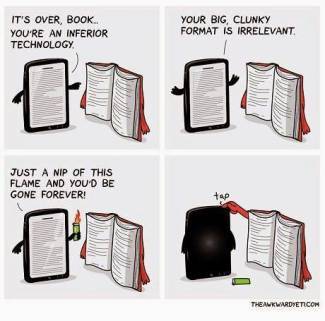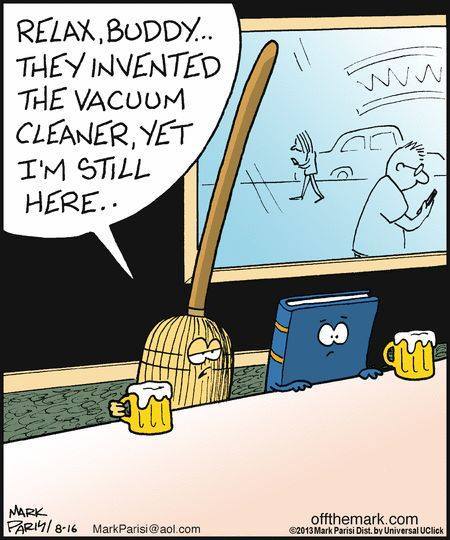I am selling my library. At least, I think I am. I’ve made the decision. Almost. It feels just a little too final to actually say it like that. But I’ve got a big library and a small house and something has got to give.
See, back in October I stopped working full-time at Grace Fellowship Church. I removed my office from the church but left the books. They are still there, 30 kilometers away. Sooner or later I need to do something about that. But I just don’t have space for them here at home. It seems like this must be the time to go all-in with ebooks.
 I already do most of my reading on my Kindle. I’m taking on the 2016 Reading Challenge and intend to read almost all of those 100+ books electronically. Not only that, but I already have most of my commentaries and reference works in Logos. I have thoroughly enjoyed that transition and am very comfortable doing research and sermon preparation with electronic books. What’s left are all of those other books, the Christian living titles, the biographies, the theology texts, the church histories. Many of them are precious to me, friends who helped me become who I am today. I do not easily bid farewell to them.
I already do most of my reading on my Kindle. I’m taking on the 2016 Reading Challenge and intend to read almost all of those 100+ books electronically. Not only that, but I already have most of my commentaries and reference works in Logos. I have thoroughly enjoyed that transition and am very comfortable doing research and sermon preparation with electronic books. What’s left are all of those other books, the Christian living titles, the biographies, the theology texts, the church histories. Many of them are precious to me, friends who helped me become who I am today. I do not easily bid farewell to them.
Am I really ready to make the leap?
Michael Hyatt recently wrote about his decision to put ebooks on the shelf for 2016 and to instead return to printed books. Ironically, this article helped seal my decision. Hyatt gave a whole list of reasons that ebooks are inferior to printed books and, while I read the article with interest, I disagreed with almost all of it. I think he may have fallen into a common trap we encounter when we transition from an old medium to a new one. We tend to want the new medium to mimic the old one and judge the new in light of the old. What we fail to account for are the ways in which the new is superior, in which the new is something entirely new. When cars were first invented, people called them “horseless carriages” and judged them in light of the horse and carriage. But over time they proved their superiority and we forgot all about that older technology. We stopped thinking about the new technology in reference to the old. I think the relationship of book to ebook will eventually prove similar.
Here are Hyatt’s reasons he is sticking with ebooks, along with my responses.
- Ebooks are out of sight and out of mind. “Physical books occupy physical space. Wherever you keep them—the shelf, the nightstand, the bathroom—it’s hard to avoid them.” Sure, but so is my Kindle. I take it with me and access it every day. In fact, the physicality of books is the very problem I am having with them. A thousand printed books take up a lot of space; a million ebooks don’t take up any.
- Ebooks engage fewer senses. “That means there is a whole tactile and spatial aspect to reading: how a book feels in the hand, how it lays out the page, and so on.” Yes, but an electronic reading device is also physical. I hold it in my hand and on that device there is a page layout. It, too, engages senses.
- Ebooks make it easier to get distracted. That is true if you are reading on your iPhone or your iPad. Then, yes, all those text messages and Angry Birds notifications will be awfully distracting. But if you have a Kindle or similar device, there is no distraction factor. Hyatt also says, “Research shows scrolling and swiping dislodge data from our short-term memories more than page-turning.” That may be true, but those studies tend to neglect the ways in which we adapt as we use our devices. The technologies get better and, meanwhile, we adapt to use them better.
- Ebooks result in less retention and comprehension. “Comprehension assumes you can map a story or an argument in your mind. The digital format works against that.” This, too, may be true, but I am not convinced of it. It also fails to account for those ways in which ebooks enhance retention and comprehension such as exporting notes and highlights to Evernote or a similar system. (See Kindle + Evernote = ♥ to learn how to do this. It will blow your mind.)
- Ebooks feel too much like online reading. “I read for speed when I’m online. But I’m looking for deeper engagement with a book. And what I find is that a screen is a screen is a screen.” I completely disagree when the screen is on a modern ereader. The screen on a device like a Kindle Voyage or Paperwhite is brilliant for reading and entirely different from the screen on an iPad or other digital device.
- Ebooks are more difficult to interact with. “I take a lot of notes when I read. I highlight and sometimes take notes in the margins. I can do that digitally as well, but it’s not as fluid.” It is true that ebooks are difficult to interact with, but the flip side is that the electronic notes are much easier to export into a system where they can be retained and otherwise put to use. So yes, the highlighting and note-taking of an ebook is in some ways inferior to that of a paper book, but it is not without its benefits. I do agree as well that ebooks have not been able to recreate the joy of thumbing through a book, and I miss that.
- Ebooks are more difficult to navigate. “A physical book is perfectly designed to fan the pages and find what you need.” You will get little argument from me here, except that ebooks make up for much of that with the ease in which they can be searched. The searchability of an ebook in some ways mitigates the difficulty in navigation.
- Ebooks provide less satisfaction in finishing. I think this is a matter of personal preference. For me, the satisfaction is not in closing the back cover but in knowing that the book is now complete (and that I now get to move on to a different book). Do you know what I love about reading Kindle books? The fact that I can with one click mark it finished in Goodreads. Reading + social networking = fun!
 For the past few years I have closely followed the evolution of ebooks and digital readers and find I am increasingly comfortable with what I see and increasingly comfortable with taking the leap. This is not to say that I do not have any concerns.
For the past few years I have closely followed the evolution of ebooks and digital readers and find I am increasingly comfortable with what I see and increasingly comfortable with taking the leap. This is not to say that I do not have any concerns.
- The companies. My primary concerns are not with the medium itself but the companies behind it—Amazon and Logos. If I am going all-in with their platforms (Logos for reference and commentary works and Amazon for most other things) I want to have assurance that the companies and their platforms will continue to be accessible and extensible for many years to come. Then again, a paper library is only ever one flood or fire away from destruction. There are few certainties in a world like this one.
- A split library. My library is already split across two very different platforms, Kindle and Logos.
- The media. My library is also split across two platforms that are locked and incompatible. This concerns me, and especially as I think back to CDs and DVDs and other media that came and went in very short order.
- The organization. Kindle offers only a very basic means of organizing a library through collections. I like to have my library organized and Kindle does not offer much help.
So I’m going to do it. I think. Here I go. Probably.
Image credit: Shutterstock










